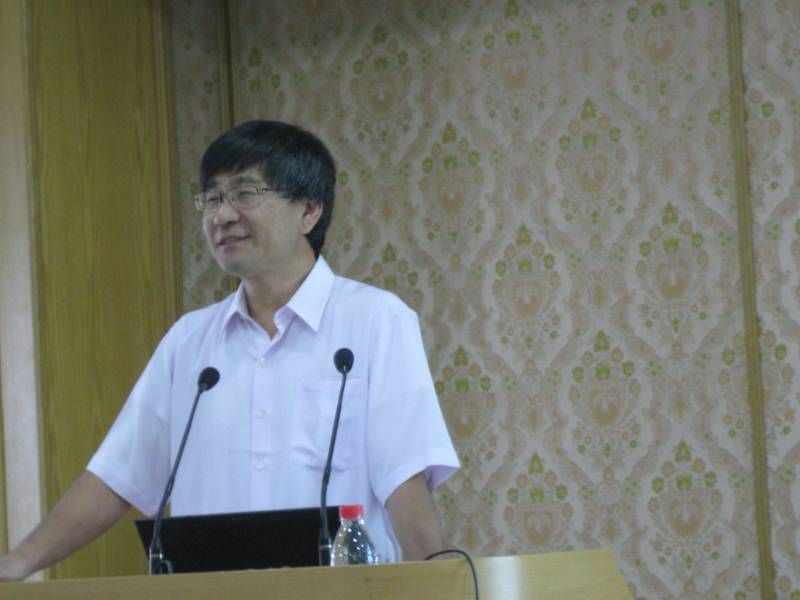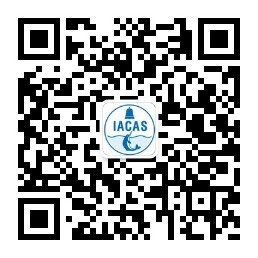Invited by the High Performance Network Laboratory of IACAS, Prof. Michael Fang from the University of Florida made three lectures on Aug. 13 and 14, ranging from “How to Do Good Research”, "Small World Phenomena in Wireless Ad Hoc Networks” and “Path Capacity in Multirate and Multihop Wireless Networks”.
In the lecture of “How to Do Good Research”, Michael started with how to become a good graduate student, continued with building a research career, and ended up with establishing a good research profession. It was a controversial topic because it was hard to define a good researcher. This topic targeted at advanced undergraduate students or beginning graduate students who were looking for some advices. Based on Michael’s own research experience, he shared what he had learned and what he thought a good researcher should be.
For the lecture of “Small World Phenomena in Wireless Ad Hoc Networks”, small world phenomena had been intensively studied in social networks since the famous Milgram experiment and their studies had also been extended to other types of complex networks. In this talk, the problems in wireless ad hoc networks had been looked into. In particular, how the small world was formed, under what conditions small worlds could be formed and the small world paths could be found using distributed algorithms had been discussed.
"Path Capacity in Multirate and Multihop Wireless Networks” introduced that finding a path with certain throughput in multihop wireless ad hoc networks was a critical and challenging task of QoS Routing. Previous studies on routing algorithms focused on networks with a single-channel rate. The capability of supporting multiple channel rates commonly seen in wireless systems had not been fully utilized in routing algorithms. In this talk, Michael presented his recent study on the impacts of multiple rates, interference and packet loss rate on the path capacity (i.e., the maximum end-to-end throughput) and his solution to the linear programming problem for the path capacity of any given path, leading to the joint routing and link scheduling optimization to find a path with the maximum path capacity. He also demonstrated that the newly introduced interference clique transmission time was the best routing metric in finding the path with high end-to-end throughput.
Biography:
Yuguang "Michael" Fang (F'08) received a Ph.D. degree in Systems Engineering from Case Western Reserve University in January 1994 and a Ph.D. degree in Electrical Engineering from Boston University in May 1997. He was an assistant professor in the Department of Electrical and Computer Engineering at New Jersey Institute of Technology from July 1998 to May 2000. He then joined the Department of Electrical and Computer Engineering at University of Florida in May 2000 as an assistant professor, got an early promotion to an associate professor with tenure in August 2003 and to a full professor in August 2005. He holds a University of Florida Research Foundation (UFRF) Professorship from 2006 to 2009, a Changjiang Scholar Chair Professorship with Xidian University, Xi'an, China, from 2008 to 2011, and a Guest Chair Professorship with Tsinghua University, China, from 2009 to 2012. He has published over 300 papers in refereed professional journals and conferences. Dr. Fang received the National Science Foundation Faculty Early Career Award in 2001 and the Office of Naval Research Young Investigator Award in 2002, and is the recipient of the Best Paper Award in IEEE International Conference on Network Protocols (ICNP) in 2006 and the recipient of the IEEE TCGN Best Paper Award in the IEEE High-Speed Networks Symposium, IEEE Globecom in 2002. He has also received a 2010-2011 UF Doctoral Dissertation Advisor/Mentoring Award, 2011 Florida Blue Key/UF Homecoming Distinguished Faculty Award and the 2009 UF College of Engineering Faculty Mentoring Award.

Michael is lecturing


